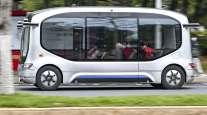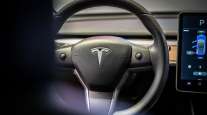New York, Los Angeles Team With Schumer on Self-Driving Vehicle Rules

New York City and Los Angeles, worried that a Senate self-driving car bill would make them hand over control of their streets to the federal government, have found a powerful ally: Minority Leader Chuck Schumer (D-N.Y.).
The AV START Act (S.1885), pushed by John Thune (R-S.D.) and Sen. Gary Peters (D-Mich.) would create a national framework to regulate self-driving cars and trucks lighter than 10,000 pounds, such as those developed by companies including Ford Motor Co. and Alphabet Inc.’s Waymo. Thune and Peters lead the Senate Commerce, Science and Transportation Committee.
The bill would pre-empt state and local authorities from regulating the design, construction and performance of autonomous vehicles and delegate that authority to the federal government. Cities worry the pre-emption language will not give them sufficient control over the emerging technology to manage traffic congestion and enforce local safety regulations.
RELATED: Rhode Island to explore autonomous shuttle pilot
Proponents once thought the bill, approved by a voice vote in committee in October, would advance through the Senate by Christmas 2017. The measure has stalled, with no resolution in sight. Schumer’s role as the Senate’s top Democrat may add to the hurdles for a bill that has broad support on both sides of the aisle.
“This was a bipartisan bill negotiated very carefully with all of the stakeholder community — Democrats and Republicans — and recorded out of committee by a voice vote. We’re willing to work with anyone who has an issue to try to resolve it, but this sort of blanket opposition will become, I think, difficult for them to sustain because this stuff is moving,” Thune said about the quickly advancing self-driving technology in an interview with Bloomberg.

Ford
New York
New York City Mayor Bill de Blasio has been an outspoken critic of the rapid deployment of self-driving technology.
DeBlaisio’s concern about AVs comes from lessons the city learned the hard way about another transportation sector disruption: the arrival of ride-hailing services such as Uber Technologies Inc. and Lyft Inc.
New York, like many other cities, is confronting increased road congestion at the same time as transit use is falling.
Total car passenger trips in New York City increased 15% between 2013 to 2017, despite declining taxi trips in that time period, according to a December 2017 study. The number of taxi and ride-hailing vehicles in the city’s center increased by 59% during that same period.
With autonomous vehicles expected to show up first in fleets of taxi-like vehicles, the prospect of having local regulation pre-empted has left leaders in major cities such as New York worried.
RELATED: MoDOT grapples with issues related to vehicle automation
“As the car becomes the driver, Congress should carefully consider how introducing fleets of AVs will play out on city streets,” Brittney Kohler, transportation and infrastructure program director at the National League of Cities, said in an e-mail to Bloomberg. “Cities have been piloting [autonomous vehicles] for a while now in close collaboration with our partners, but the AV START bill is a huge shift that expands the testing environment to every road.”

Ford
Coast to Coast
New York approached its congressional delegation about getting changes made to the bill. Schumer stepped in around February, according to officials in New York City Hall and the Los Angeles Department of Transportation. The Democratic leader suggested New York work with the Auto Alliance — the trade group representing big automakers with factories in the United States — to craft possible changes to the bill text. New York, with language in hand, approached Los Angeles, which, in turn, organized several other large California cities, including a consortium of Bay Area ones, officials in the two cities told Bloomberg.
The officials spoke on condition of anonymity to discuss internal policy considerations and ongoing negotiations.
Schumer’s office did not respond to repeated requests for comment.
Schumer’s involvement has been muted, though, compared with the likes of Sen. Dianne Feinstein (D-Calif.), who one lobbyist described as “carrying water” for L.A. Even New York’s junior senator, Democrat Kirsten Gillibrand, has had a higher public profile on the issue than Schumer. She signed a letter with Feinstein and three other senators in February calling for changes to the Senate’s framework for self-driving technology.
RELATED: Autonomous cars’ shortcomings revealed in California DMV reports
Schumer has left the negotiations on behalf of New York to Gillibrand, who is working with Commerce Committee staff to massage the bill to address city concerns, according to congressional aides, industry lobbyists and New York and L.A. city officials.
Pre-emption Problem
Cities, states and localities want to know they can tell self-driving cars to obey local traffic laws, such as school zone speed restrictions, and can control testing on increasingly congested city streets.

Ford partnered with Domino’s in 2017 for autonomous pizza delivery trials. (Ford Motor Co.)
Self-driving carmakers, advocates and their federal proponents want to make sure cities, states and localities don’t hold the technology to a tougher standard than human drivers.
The bill language as written accomplishes this balance, Commerce aides and the bill’s industry supporters told Bloomberg.
“You should be able to regulate speeds around schools or road speed limits. But if you are creating a separate set of rules for AVs and regular cars, you’re not regulating the speed of the road, you’re regulating the AVs,” Amitai Bin-Nun, vice president of autonomous vehicles and mobility innovation at Securing America’s Future Energy, said in an interview.
RELATED: Minnesota safety officials look to driverless vehicles to reduce fatalities
Speed limits are one thing, but cities don’t think it is clear that they can require driver tests of self-driving cars.
Currently, states control the process for licensing drivers. But when the driver is a computer, it raises the question of whether a state should require the computer to pass a driving test before the car can drive on public roads. City officials do not believe they would have that authority under the bill.

Ford
“Cities who understand the ins and outs of testing AVs on city streets have worked with Commerce staff to find the right balance in the bill to avoid a patchwork, but also confirm cities’ continued role,” the League of Cities’ Kohler said. “But important questions still remain which is why negotiations are still ongoing.”
Proponents of the current bill believe regulating the safety of the technology, which is what a driving test is meant to do, is the traditional role of the federal government and should remain as such.
“In a regulatory vacuum, all sorts of agencies and municipalities are finding ways to horn in on the debate,” Bin-Nun said. “And that’s just not the traditional role. The taxi and limousine commission is not set up to regulate autonomous vehicles. Taxi regulators are weighing in on when AVs are safe, and I don’t think they should be doing so.”
The Road Ahead
Thune and Peters each floated the bill for unanimous Senate consent in November, which is when they became aware of Feinstein’s concerns. Since then, they’ve been negotiating possible changes.
RELATED: Nation’s first self-driving car service for the public coming to Texas
Schumer’s entrance into the negotiations does not change things, in Peters’ mind.

Getty Images
“Right now, under unanimous consent, everyone has equal say when it comes to trying to get it through,” Peters said.
“Obviously if he’s happy with the bill, it’s good to have him on my side because he could help push it so we could actually get a vote.”
One strike against the self-driving car bill is there is no deadline to force its consideration, like there is with annual spending bills, for example. That may mean it languishes unless it gets attached to a must-pass piece of legislation. Peters and Thune say they are still looking for possible compromises that would allow the bill to be passed without even a roll call vote.
“You want to treat everybody and their views seriously, which I think we have and will continue to do, but ultimately there does come a time when you have to vote on a bill,” Peters said. “Perfection is not a standard that any of us can reach.”
The bill authors also are looking for ways to move the bill. Attaching it to a Federal Aviation Administration reauthorization bill (S. 1405) is one possibility, but that bill’s floor prospects, despite a September deadline to reauthorize federal aviation programs, remain murky.
“It would be really helpful to have a deadline. Unfortunately, we don’t,” Thune said. “We’ve just got a bill that’s kind of hanging out there for people to shoot at.”




